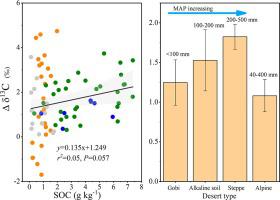Catena ( IF 5.4 ) Pub Date : 2021-04-17 , DOI: 10.1016/j.catena.2021.105365 Jie Liu , Yan-gui Su , Yan Li , Gang Huang

|
δ13C enrichment (Δ δ13C) is an effective indicator to reflect the temporal dynamics of soil organic carbon (SOC) stock which is usually difficult to detect due to the slow turnover rate of SOC; however, because of the rare simultaneous measurements of both plant and soil δ13C, it is usually difficult to explore the geographic variations and controlling factors of Δ δ13C (δ13C of surface soil subtracting that of plant leaf). In this study, plant leaf δ13C, soil δ13C, and Δ δ13C were investigated along steep climatic and edaphic gradients to improve the understanding of SOC dynamics in deserts of northern China. Both soil δ13C and plant leaf δ13C decreased with mean annual precipitation (MAP), and soil δ13C was positively related to plant leaf δ13C and was higher than plant leaf δ13C across all C3 plant-dominated deserts (Alkaline soil desert, Gobi desert, alpine desert, and temperate steppe desert) except C4 woody shrub-dominated sandy desert. Δ δ13C was positively related to the SOC and soil silt contents across the C3-dominated desert transect, suggesting a faster decomposition of SOC at higher Δ δ13C sites. The shrub importance value index in the plant community enhanced Δ δ13C by increasing the soil silt and SOC contents in both steppe and alkaline soil deserts, indicating that shrub encroachment can increase the SOC content and SOC decomposition. Our results indicate that shrub colonization not only increases SOC content but also regulates SOC decomposition via changing vegetation cover and edaphic variables.









































 京公网安备 11010802027423号
京公网安备 11010802027423号